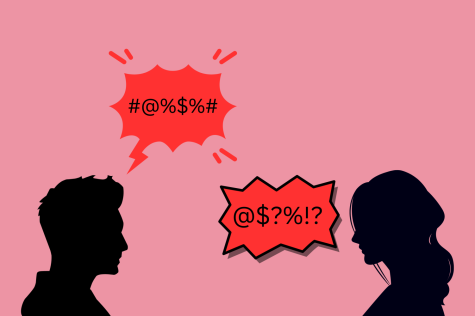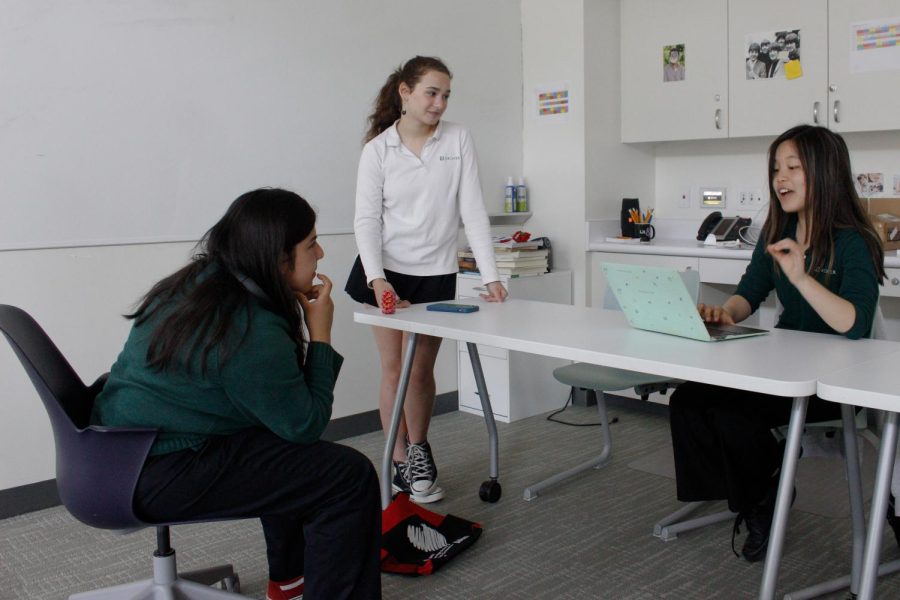The culture of discourse, importance of conversation, communication in the 21st century
Photo credit: Oona
Junior Maia Alvarez and sophomores Cezanne Silverton and Allie Yang practice for the speech and debate club’s national competition. According to another debate team member Lucy Williams (’25), the art and language of disagreement has largely been forgotten but is fundamental to understanding opposing opinions and one’s own beliefs.
May 27, 2023
Have you ever had a conversation with someone and felt frustrated or tempted to give up? According to the Pew Research Center, six-tenths of adults in the U.S. say it is “frustrating” and “stressful” to talk about politics with someone they disagree with. But, almost five-tenths say they have given up on having conversations like these altogether.
Oxford Language defines conversation as “a talk — in which ideas are exchanged.” History teacher Elana Goldbaum explained how the exchange of opinions and ideas is critical for democracy and creates growth in society. But these Pew Research studies suggest that the culture of discussing politics with people holding opposing views is declining. Goldbaum said conversation and discourse in a modern world are ever-present and critical for society.
Importance of Conversation
Goldbaum completed her dissertation for her doctorate on difficult conversations and teaching difficult knowledge at Texas A&M University. The title of her dissertation is “Racism, Genocide, and Social Hatreds: How do we teach knowledge that hurts? Exploring a community of practice for educator support.” Goldbaum stated one of the benefits of conversing with people you disagree with and people with different identities is it challenges stereotypes and helps people understand more perspectives.
“Building those relationships across different opinions and identities is the first step to understanding people outside of your own bubble,” Goldbaum said. “If you don’t engage in that, then you’re going to have a very limited life experience, and that is not good for democracy.”

One organization inspiring more conversation around and openness to differences is the Human Library. The mission of this organization is to “build a positive framework for conversations that can challenge stereotypes and prejudices through dialogue.” Located in Copenhagen, Denmark, The Human Library is a place where people talk to and listen to the stories of people who are different from them. This organization challenges people to face their bias and prejudice to “help rid discrimination, prevent conflicts and contribute to greater human cohesion across social, religious and ethnic divisions.”
According to debate team member Lucy Williams (’25), debate and conversation are critical for self-growth and education. Williams said debate forces one to reflect on their own beliefs by challenging their opinions and other opinions. The debate team strengthened her skills for talking with people she disagrees with. She has learned to discern between people and their values.
“In order to learn more and truly flush out your beliefs, you should be talking with people you don’t agree with. I think there is no way to have an opinion without an opposing opinion, because there is no comparison,” Williams said. “With our society right now, people think an opinion is the entire person, which I think is very detrimental to relationships. This is the wrong way to look at beliefs because beliefs are not people, beliefs are something people hold. I feel like no one realizes that anymore.”
Disagreement in Politics
The Pew Research Center found nearly 50% of both Democrats and Republicans say they are afraid of people in the opposing party. Former Delaware State Senator Colin Bonini was first elected to office in 1994 representing the Republican party. He recalled more openness to engage and listening to opposing party members within politics in the beginning of his career and described the decline in this behavior as “worrisome.”
“There is all sorts of basic human connections and lessons we don’t get when all we do is spend time with and talk to people who we agree with,” Bonini said.
Bonini worked on the senate floor for nearly 30 years and said conversation is critical in a functioning democracy. He described a moment on the first day of legislative session in his final term when he introduced himself to the new congress members. They were surprised by his kindness, as they initially believed he would be unwelcoming to them because they were in different political parties. Bonini says he understands these initial reactions but believes the misconceptions could be avoided if people engaged with each other more.
“Some people say, ‘You will always find something in common,’ but that’s not necessarily true,” Bonini said. “With some of my former colleagues, there’s not a single issue we agree on, but we will still engage for the better.”
Bonini said the decline in engagement is fairly new to politics and is caused by closed-mindedness.
“It’s become a conscious effort to [engage with people you disagree with]. I think we are now at the point where you literally need to say: ‘I am going to engage with this person who I disagree with and remember that this person might have something valuable I can learn.” Bonini said. “And if this person is willing to listen to me maybe they can learn something too.’ I think this thinking used to be a norm, but today it takes effort.”
The Impact of Social Media and COVID-19
NPR described the many ways lives have changed because of the COVID-19 pandemic, including drastic changes to modes of communication. As much of the world went into a yearlong lockdown, the U.S. was forced to communicate using technology such as Zoom and email. Because people weren’t able to communicate face-to-face for so long, the art of conversation changed.
“With COVID-19, face-to-face interaction became hard,” Williams said. “For conversing with people you disagree with, it was put on pause. And the disagreeing language changed. It felt like people just didn’t want to converse anymore.”
A Brookings Institute report referenced the American Economic Review, who conducted a study of more than 17,000 Americans demonstrating how “Facebook’s content-ranking algorithm may limit users’ exposure to news outlets offering viewpoints contrary to their own — and thereby [increasing] polarization” and feeding confirmation bias.
On the other hand, social media has given users who have different opinions and stories a platform to share them. According to Goldbaum, this has its benefits and consequences, but it is important to challenge people and opinions seen online.
“It is especially important with prominent men who are on social media spreading hateful messages. And if no one engages with these people, then they typically get more entrenched in their ideology,” Goldbaum said.
How to Engage or Disengage in Conversation
Uri Herscher is the founder of the Skirball Cultural Center and a rabbi who was born in Tel Aviv, Israel. He has devoted his life to culture and religion and believes conversations are a “crucial” part of our society as long as people have an open mind.
“The only reason I would quit [talking] with that person is if I could deal with another person who would be somewhat more flexible in their thinking,” Herscher said. “I don’t want to exhaust myself talking only with somebody who negates everything I say. ”
Goldbaum described how the decision to engage is very personal and involves people’s comfort levels.
“Everyone has boundaries and for many people. Engaging in difficult conversation where emotions are high has a lot to do with the energy and bandwidth they have to engage with someone,” Goldbaum said.
Listen to the below audio clip to hear Uri Herscher discuss how to engange in conversations and disagreements.
Williams stated it can be hard to understand opposing points of view, and it can be challenging to have disagreements because people hold beliefs close to their heart. Goldbaum recommended tools like creating community norms and practices that can be used in disagreements to have more constructive conversation for both parties.
“If you’ve already made up your mind before the conversation begins, it’s not going go anywhere,” Goldbaum said. “And I do want to emphasize that it’s hard, and nobody’s got it right. Everybody’s working on it.”









